
Keywords, as we all know, are the bread and butter of SEO. They are how potential customers find us online and are what we build entire strategies around.
But targeting the best keywords for your business is tough. Short tail keywords are attractive, but are often too competitive, too high volume for most to fight for—so what is the alternative?
Here’s where long-tail keywords come in. They provide an untapped opportunity to drive more relevant traffic to your website and connect with customers further along their purchase journey.
In this article, we’ll dive deep into the essence of long-tail keywords, examining their importance, advantages, and—most importantly—how to incorporate them effortlessly into your content strategy.
What is a Long-Tail Keyword?
Long-tail keywords in SEO are keyword phrases with more than three words that are extremely focused and specialized. These keywords are more targeted and reflect users’ exact search intentions than generic or broad-based keywords. They can also provide users with a more customized search experience.
The Power of Precision
When you are conducting keyword research, you can specifically target the wants and demands of your target market. You may draw readers who are more likely to convert by including these certain terms in your article.
For instance, if you own a running shoe business, it will be very difficult to rank at the top for the keyword “best running shoes,” much less gain much traffic from your efforts.
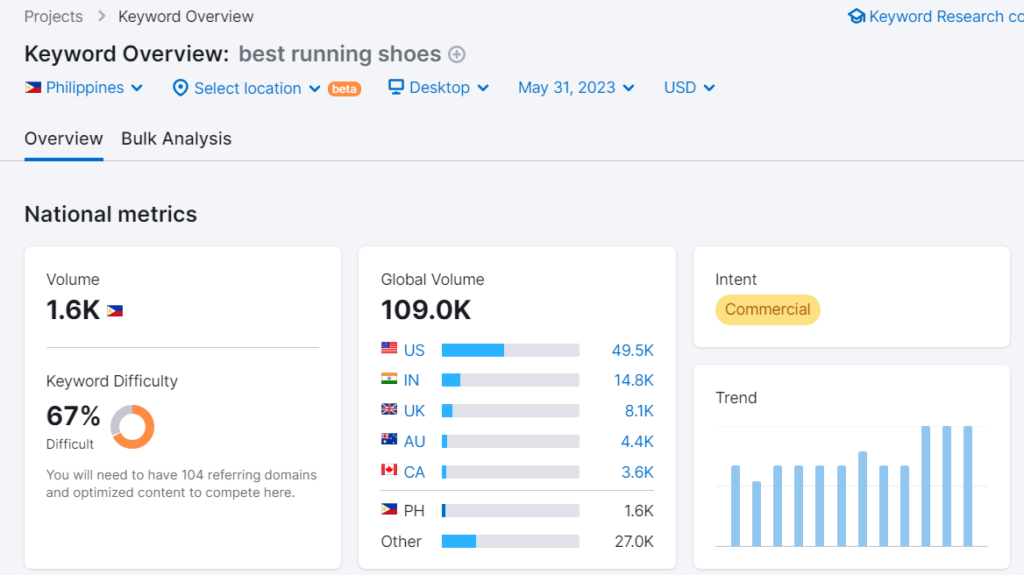

If, however, you decide to target the keyword “women’s running shoes for wide feet” instead, then you are more likely to draw highly interested customers who are looking for that exact product.
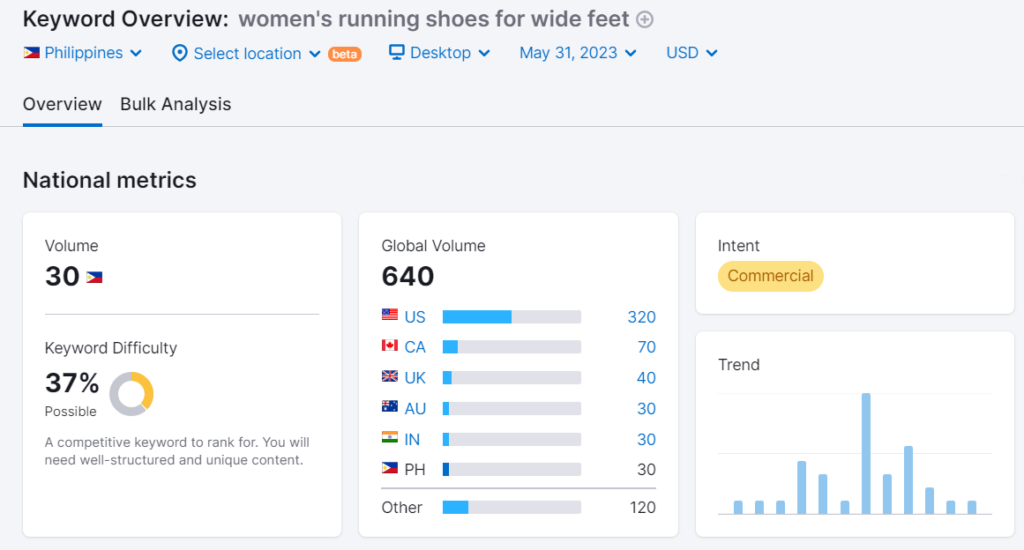

After all, when someone enters that very long, very specific keyword, they are demanding one thing: the kind of product that they just searched for on Google.
By positioning yourself as someone who can answer their demand, you grab their attention, answer their search question, and ultimately bring in users who are more likely to buy your product.
There is a value of precision that specific keywords provide. You may attract people who have a precise aim and are inclined to become clients by using such focused terms.
Less Competition=Less Cost
Though these keywords often have lower search volumes since they are more specific than short tail or broad keywords, there often are fewer opponents for this from other websites.
In that sense, you can also easily rank at the top of search engine results pages (SERPs) for these keywords, and attract more customers by focusing on untapped niches in a crowded online market.
So, this level of specificity of the keyword not only helps you reach a particular target audience but also distinguishes you from your competitors who may only optimize for broader keywords like “best running shoes.”
By catering to the needs and preferences of your audience, you also position your website as a trusted and reliable source for those looking for that particular product.
Providing people with exactly what they’re looking for will allow you to gain traffic almost effortlessly in a less competitive space, and drive conversions on your website.
What is an Example of a Long-Tail Keyword?
To further comprehend the idea of what a long-tail keyword is, let’s look at an example.
Consider a bakery that specializes in making desserts and sweets without gluten.
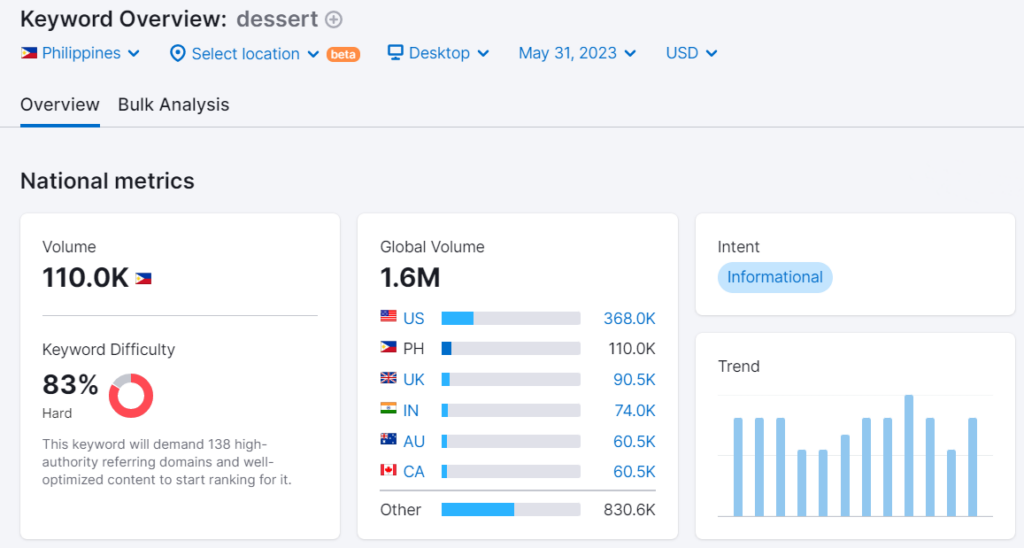

Instead of optimizing your website for a short tail keyword like “dessert,” an extended keyword example you might consider is “gluten free chocolate chip cookies.”
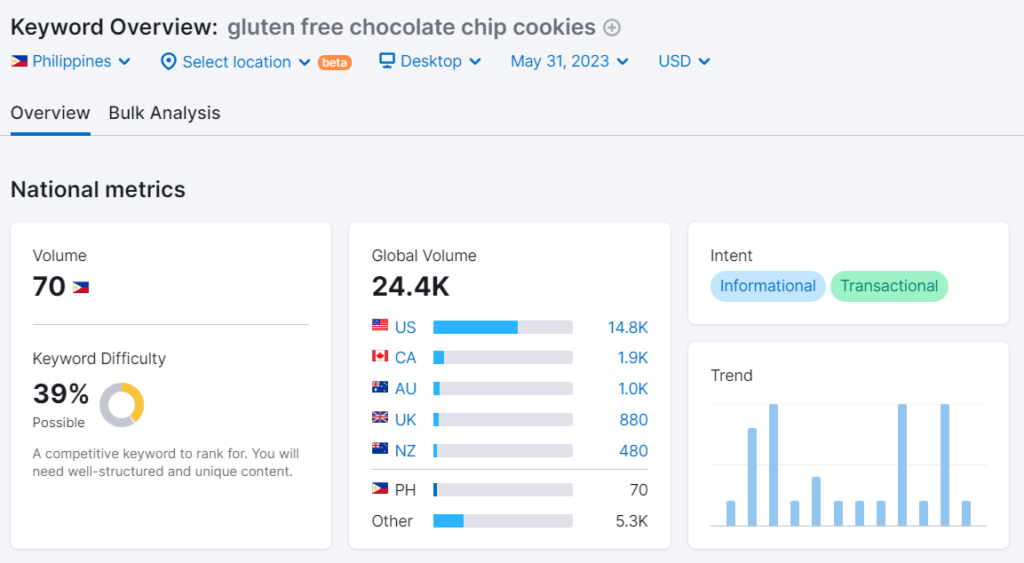

This phrase is extremely particular, addressing the dietary needs of a smaller audience looking for a particular type of dessert.
Aside from dietary needs, another way to find long-tail keywords is to look at the preferences of a potential customer. Things like flavor, color, or size can lead to a long-tail keyword. A customer might look for “mini chocolate frosted cupcakes,” which is another area you could target.
In short, almost every descriptor or variation of the products you offer is a long-tail keyword that you can potentially target.
Why Should You Integrate Long-Tail Keywords in Your Blog Posts?
Using long-tail keywords doesn’t just have to be on your website pages—it’s a great strategy for your monthly blogs, too.
Integrating these in your blog posts can have a significant impact on both your entire content plan and SEO efforts.
Focused Traffic
As I said earlier—these keywords reveal users’ intentions when they look for certain knowledge, goods, or services.
You can draw readers who are more interested in your content and offers by including long-tail keywords in your blog entries.
These users are also often further along in the purchasing process, which increases their likelihood of becoming customers.
You can direct targeted visitors to your blog and improve your chances of accomplishing your conversion goals by tailoring your content to their particular demands.
Enhanced Relevance
By focusing on writing for long-tail keywords, you can produce content that is incredibly relevant to the particular wants and needs of your target audience. You can satisfy their expectations by providing them with useful and informational blog entries by answering their specific questions.
This can also position your blog post as a reliable source of information in SERPs—usually in the form of a featured snippet or rich result for that search query.
Improved Search Rankings
High competition makes it difficult to rank highly in the search results for short, generalized keywords.
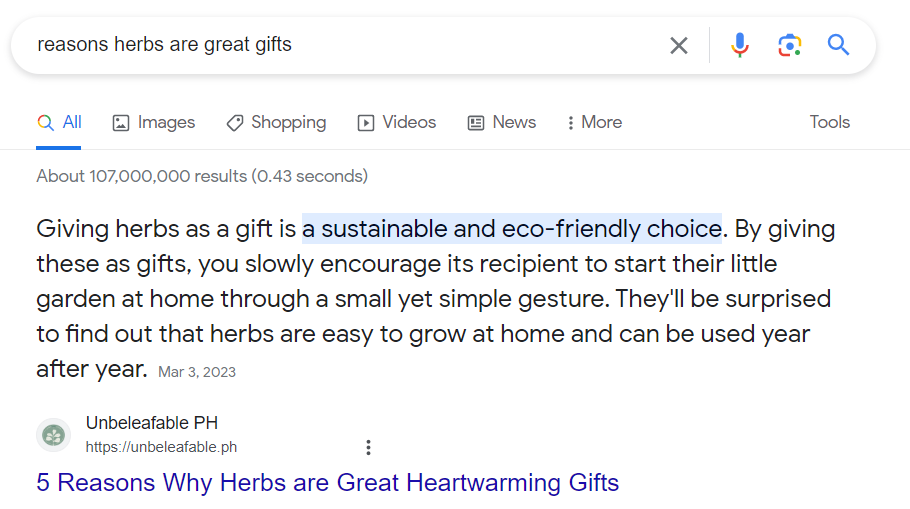

On the other hand, long keywords frequently have a lower search volume and face fewer competitors. By targeting these, you drive better results for much less effort and time spent. This is especially helpful if you work in a cutthroat industry.
You can quickly build your online presence, improve your exposure, and increase organic blog traffic by concentrating on long keyphrases.
When Should You Use Long-Tail Keywords in Your SEO?
To maximize their impact, long keyphrases must be used in the right situations within your SEO plan.
Here are some pointers on when you should use these keywords.
Niche Targeting
Long-tail keywords might help you more successfully reach your target market if your company works in a particular niche or caters to a specialized demographic. Although they could draw in a larger audience, generic keywords do not guarantee that they will be interested in your particular services.
You may boost your chances of bringing in highly relevant traffic by selecting keywords that represent the particular demands, preferences, or pain points of your audience.
For instance, if you sell eco-friendly yoga mats, you may reach yoga practitioners who are concerned about the environment and are looking for sustainable products by optimizing your SEO using long keywords like “natural rubber non-toxic yoga mats.”
Entering Competitive Industries
In highly competitive industries, it might be difficult to rank effectively for generic keywords in highly competitive sectors. Long-tail keywords provide you the chance to stand out and draw in a smaller but more intent audience.
You might find several long-tail keywords once you start your competitors’ analysis. When you do, you’ll see that the difficulty of targeting these is low, since they have lower search volumes and fewer people actively trying to rank for them.
This may be a golden opportunity for you—you can enter your industry through what is essentially a side door. Take gaming laptops, for example, where your website could enter by marketing your “thin and light budget gaming laptops.”
Focusing on a very specific part of the market can draw visitors who are actively looking for the exact goods, services, or information you provide. And, before you know it, you’ll have secured territory in a competitive arena.
Content Optimization
I said earlier that long-tail keywords are great for blog posts, and this plays into a larger strategy for content optimization.
Users frequently utilize longer and more precise keyword phrases while looking for information or solutions to their problems. You can give thorough and specific responses to these questions by including long keywords in your blog posts, articles, and FAQ sections.


Providing useful material not only enhances user experience but also helps address any content gaps your posts or pages may have. They can help you establish authority in your field and draw in people looking for in-depth information by including them in your content optimization plan.
Key Takeaway
Long-tail keywords are a potent optimization technique that increases conversion rates and drives focused visitors. You attract interested visitors who are more inclined to take action by concentrating on precise, pertinent keywords. These keywords provide you with a huge competitive advantage simply because of how targeted and exact they are.
Maximize your SEO potential now with long-tail keywords. Take charge of your website’s visibility, attract highly engaged visitors, and drive conversions like never before.
<!–
–>
- SEO Powered Content & PR Distribution. Get Amplified Today.
- PlatoAiStream. Web3 Data Intelligence. Knowledge Amplified. Access Here.
- Minting the Future w Adryenn Ashley. Access Here.
- Buy and Sell Shares in PRE-IPO Companies with PREIPO®. Access Here.
- Source: https://seo-hacker.com/long-tail-keywords/



